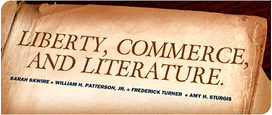Was Ayn Rand right that romanticism is the proper literary reflection of capitalism? I like to work by referring questions to the nature of the genre.
The romance in its most basic form is a symmetrical story of personal status lost and then restored (see Northrop Frye’s excellent study The Secular Scripture). What I’ve noticed is that if you break that symmetry, the story made from the Descent phase of a romance is a classical tragedy: there is no return from the nightmare world, and the anagnorisis (recognition) is the point of the fall. On the other hand, the story made from the Ascent phase is a classical comedy, and the most enduring trope of the comedy is the marriage — the founding of a new proper community or society, to give the social status which is the subject matter of the romance.
Certainly there are elements of romance story structure that echo the experience of personal entrepreneurship — the risk and hard work corresponds neatly to the descent phase and recomplications of the struggle in the nightmare world; the hope of commercial success, in which the struggle pays off, corresponds to the ascent phase and restoration –
– but that is only one aspect of the human activity of commerce. Certainly it is a story that bears retelling, but it is not the only appropriate story that can be told about liberty and commerce. As nearly everyone has pointed out, there is a certain overdeterminism of what attitudes are fashionably associated with the modern novel, going back as far as Trollope — but surely the formation of the mind and the personality of the entrepreneur has the potential to be artistically satisfying, and that seems to call for a novelistic treatment. Rand herself embodied this theme in her giant melodrama, Atlas Shrugged (also, be it noted, a science fiction work), in what is to my mind the finest part of that book — the battle for the soul of Henry Reardon.

